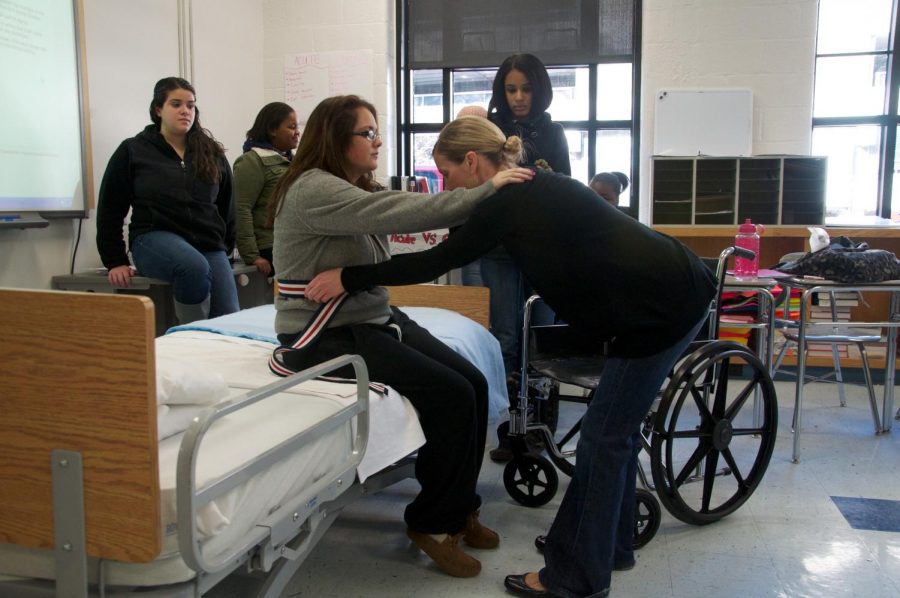Training the Next Generation of Health Professionals
Pictured: Students learn how to assist patients into a wheelchair.
December 8, 2019
For almost thirteen years, the Health Assisting RSTA Program at CRLS has been fostering student interest in healthcare careers. The program is structured in a format that carefully introduces the students to the field and grants them a chance to gain a deep understanding of health assisting, while providing a multitude of opportunities to implement their skills on real patients.
The Health Assisting faculty—Mechille Venus, Kristian McLean, and Gana Hughes—have a combined 65+ years of nursing experience. These three incredibly qualified teachers guide the students along the program through four available courses.
Ms. Venus instructs the first two courses, which are typically taken during freshman year. She explains, “I have a quarter-long intro for 9th graders, which is combined with early education and care. I teach them about the different kinds of health careers that they can get into, and then specifically about becoming a Certified Nursing Assistant (CNA), which is what we teach here. I also teach level one, which is the foundation. They learn different types of diseases, how the body operates, the different kinds of healthcare facilities that nursing assistants can work in, major diseases that they’ll see, like heart disease, stroke, dementia… and then I also get them CPR certified.”
The CPR and first-aid certification students receive leads them to level two, instructed by Ms. McLean. “In level two (which is generally junior year, if you take level one as a sophomore), the main focus is to prepare them for the CNA test,” Ms. McLean explains. “[Students] learn how to take care of patients, head to toe. First, we review things like healthcare facilities and who to report to … and then medical ethics, the law, and we get into infection control, so how to break the chain of infection, as well as what impact that has on public health. We do a classroom component as well as some stuff in the lab, and so they’re introduced here and then they go out to clinical and they put their skills into actual real-life practice.”
Senior year, students move into the level three class with Ms. Hughes. She told Register Forum, “Our focus is on employability. We have a co-op work program where our students go out to work, they get paid by their employer, which would be Mount Auburn Hospital or Spaulding Rehab Hospital. They go out from 7:30 to 10:30 every morning Monday through Friday and they make a decent sized paycheck every week working under their own CNA license which they earned in level two.” The level three class focuses on resumes, the interview process, and how to exercise sensitivity to different cultures in a hospital environment.”
Adamari Lopez ’21, who is currently in level two of the program, is especially appreciative of the training she has received, stating that she would “definitely like to go into the medical field.” Lopez reflects, “Knowing how to use the skills in the real world, and putting what you’re learning into everyday life has been a highlight. Last year we got to observe in Spaulding Hospital, and we were using the equipment and wearing our scrubs and everything … So many workers kept looking at us like we were little kids, but we’re actually going to be working there. Seeing that and getting a head start was really cool.”
One of the greatest benefits that students like Lopez can gain from the program is their foothold into a career in healthcare and the rich experience they will already have gained before they graduate high school. Ms. Hughes noted that “several [students] have gone through school and now work on the floor at the hospitals where they did [your] co-op, so it definitely gets their foot in the door in the healthcare world. And it truly is a boost because [getting that first job] is the hardest part of any career, especially with healthcare and no experience, so it’s a real advantage that they have over other people.”
This piece also appears in our November 2019 print edition.











